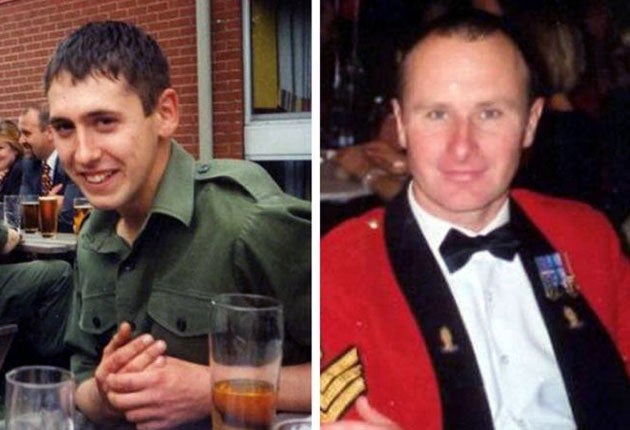Iraqi pair are cleared of killing two British soldiers

Your support helps us to tell the story
From reproductive rights to climate change to Big Tech, The Independent is on the ground when the story is developing. Whether it's investigating the financials of Elon Musk's pro-Trump PAC or producing our latest documentary, 'The A Word', which shines a light on the American women fighting for reproductive rights, we know how important it is to parse out the facts from the messaging.
At such a critical moment in US history, we need reporters on the ground. Your donation allows us to keep sending journalists to speak to both sides of the story.
The Independent is trusted by Americans across the entire political spectrum. And unlike many other quality news outlets, we choose not to lock Americans out of our reporting and analysis with paywalls. We believe quality journalism should be available to everyone, paid for by those who can afford it.
Your support makes all the difference.Two Iraqis accused of murdering two British soldiers have had the charges against them dropped following a hearing at a criminal court in Baghdad.
Faisal al-Saadoon and Khalaf Mufdhi faced the death penalty after they were controversially handed over to the Iraqi authorities by Britain in defiance of a European court order last year.
The defendants, who remain in Iraqi custody, were said to be officials of Iraq's former ruling Ba'ath party who were responsible for the shooting of the wounded British soldiers after they were captured by militias near Basra in 2003. Pictures taken of Luke Allsopp and Simon Cullingworth after the ambush were later shown on al-Jazeera TV, provoking Tony Blair to describe the murders as "cruelty beyond all human comprehension".
The two Iraqi suspects, who said they were innocent teachers, were picked up by British forces operating in the area and handed over to the Iraqi High Tribunal last December after the House of Lords rejected objections to their being tried in Iraq. Lawyers for the men had argued that allowing them to stand trial in Iraq, where they could face the death penalty, violated both the European Convention on Human Rights and the 1998 Human Rights Act.
Staff Sgt Cullingworth and Sapper Allsopp were both wounded when Iraqi Fedayeen forces ambushed their convoy on the outskirts of Zubayr on March 2003. While some members of the convoy escaped, the pair were taken to a local Ba'ath party headquarters and then to an Iraqi intelligence base, where they were shot dead.
The Ministry of Defence, the Foreign Office and the Ministry of Justice said at the time that they had been given assurances at the "highest level" that both men would receive a fair trial and treatment, whatever the outcome of the case.
Phil Shiner, solicitor for the two men, said: "It never made sense that the UK should detain without trial for years two middle-aged teachers before deciding at the very last minute that they were responsible for these terrible murders. Perhaps those in Government responsible might now reflect upon whether it was worth breaching the ECHR order on New Year's Eve."
Mazin Younis of the Iraqi League, who worked alongside Public Interest Lawyers, said: "It was shocking to learn that our Government was running a mini-Guantanamo in southern Iraq, where these two detainees were held without trial for over five years, outside the boundaries of both Iraqi and British legal jurisdiction. I am absolutely delighted with today's judgment. However, we as a society must ensure that, in the future, military rules which allowed stealing years of the lives of two innocent men are never again applied anywhere in the world."
An MoD spokesperson said: “Throughout this case, the Ministry of Defence has acted in the interests of justice and in the interests of the families of SSgt Cullingworth and Spr Allsopp. We fully support the independence of the Iraqi judiciary and its ability to try Iraqi nationals. It is worth noting that Mr Al Sadoon and Mr Mufdhi have not been found innocent of any involvement in the murders of two British servicemen. As this case has now gone to appeal, it would be inappropriate to comment further on today’s judgment.”
Join our commenting forum
Join thought-provoking conversations, follow other Independent readers and see their replies
Comments